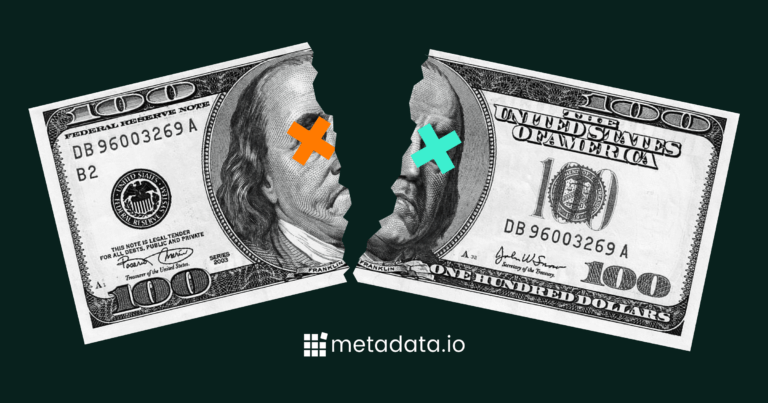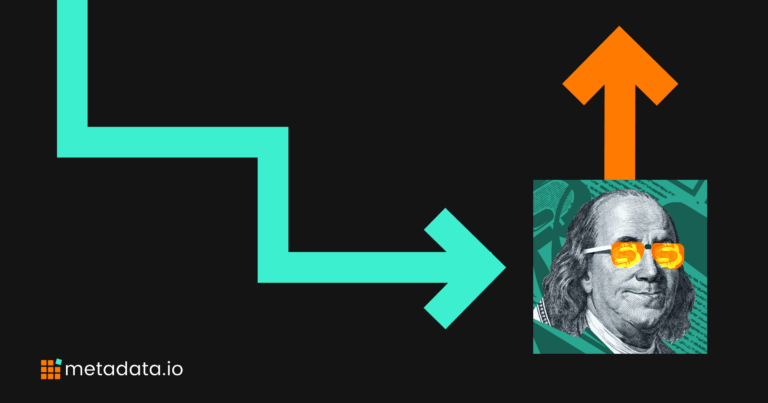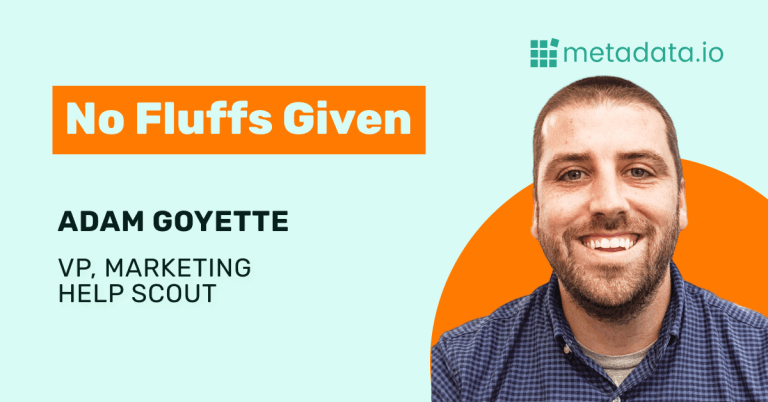LinkedIn Ad Benchmarks: CTR, CPC, and Conversion Rate
It’s not exactly news that LinkedIn advertising can be expensive.
Google that phrase, and you’ll see articles like “Why are LinkedIn ads so dang expensive?” and “LinkedIn is the most expensive digital advertising platform.”
But, long story short, the B2B-heavy audience and granular targeting on LinkedIn make the higher cost worth it for B2B advertisers.
A higher cost per click matters a lot less if you’re seeing good conversion rates all the way through to closed-won revenue.
Our customers’ LinkedIn ad experiments prove that out.
In this data-backed guide, we’ll cover:
- The most popular CTAs on LinkedIn
- The most effective CTAs on LinkedIn
- Good CTR for LinkedIn ads
- The average CPC for LinkedIn ads
- The average conversion rate for LinkedIn
Keep reading for more! 👇
We analyzed actual campaign data from every experiment Metadata customers ran in 2021 to find the legit paid social media benchmarks you’ve been looking for.
That’s 50,000 LinkedIn advertising experiments and nearly $30M in ad spend—all the data you need, in other words, to make more informed decisions for your own LinkedIn advertising.

Looking for a bit more? Check out our full 2022 Paid Social Benchmarks Report.
What are the most popular CTAs on LinkedIn?
When you place display ads on LinkedIn—including image ads, text ads, and carousel ads—the platform gives you a handful of CTA options. The four most popular LinkedIn CTAs are:
- Download
- Learn More
- Sign Up
- Register
Metadata users give more weight to CTAs aimed at lead generation via content (“Download”) and demo requests via sales pages (“Learn More”).*
*Note: This data includes Conversation ads. By default, the data you can access in our Benchmark dashboard does not. You can add conversation ad data in the ‘Ad Format’ dropdown.
Looking at nearly 50,000 experiments in 2021, advertisers used these two CTAs for over 80% of their campaigns. The other two options—Sign Up and Register—are most likely pointed to specific events, webinars, and in some cases demo sign-ups.
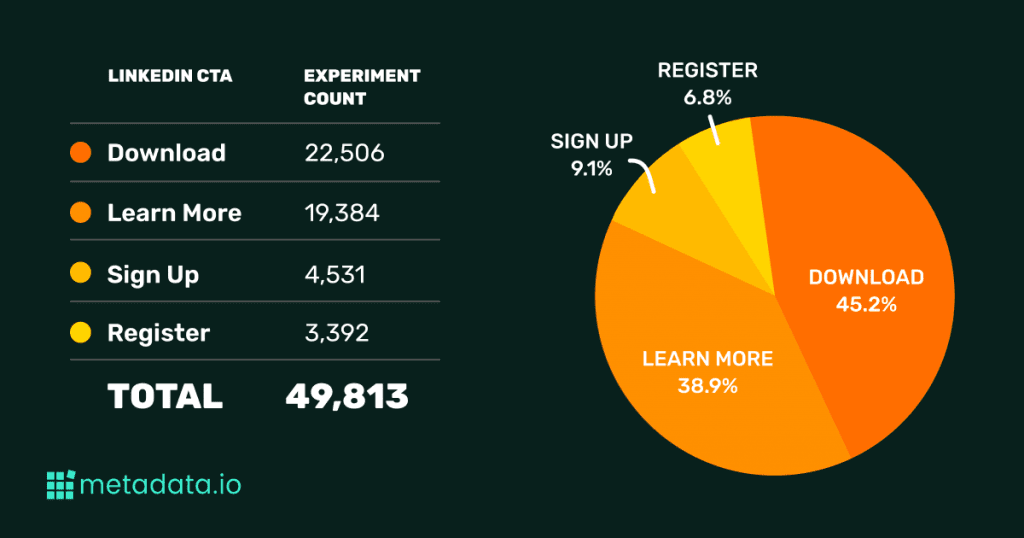
Those are the most popular CTAs on LinkedIn. But what about the most effective?
What are the most effective CTAs on LinkedIn?
Like any good marketer, we’ll tell you: it depends. The highest CTR doesn’t always translate into the lowest CPC, so you’ll have to look at your own budget.
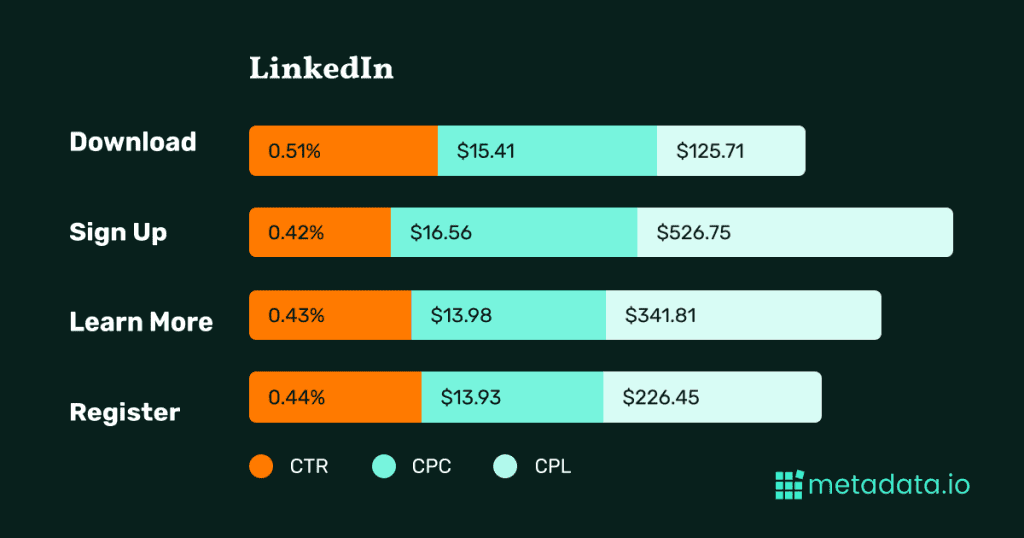
That said:
- “Download” has both the highest CTR and the lowest CPL. Could it be time to start experimenting with high-quality gated content in your LinkedIn experiments?
- “Learn More” and “Register” have similar CTRs and CPCs, though the latter has a much lower CPL. Experiment with both demo and event CTAs to see what works best for your audience.
- “Sign Up” manages to have the lowest CTR and highest CPC and CPL. All signs point to trying out the other LinkedIn CTAs, first.

What is a good CTR for LinkedIn ads?
Metadata customers separate their LinkedIn experiments into two distinct camps: lead generation and brand awareness. Brand awareness ads are optimized for clicks, while lead gen ads can be tracked all the way through to closed-won revenue.
Across both types of campaigns, the average CTR on LinkedIn in 2021 was 0.67%.
That said, LinkedIn advertisers saw a fairly large range in CTRs: from 0.32% on the lower end to 4.40% on the high end.
Side note: this is exactly why we recommend that you use these benchmarks as a starting point, then set your own benchmarks as you invest in LinkedIn ads. A 0.67% CTR on LinkedIn is a good KPI to start with, but your own success metrics will vary based on your offer, your creative, and your audience size and demographics.
(More on setting up your own benchmarks at the bottom of this article—along with the full data set!)

What’s the average CPC for LinkedIn ads?
While CPC isn’t the end-all-be-all of your LinkedIn advertising KPIs, it’s a good leading indicator of how effective your campaigns are. You don’t want to overpay for clicks, only to find that visitors aren’t converting further down the funnel.
Across all campaign and offer types, LinkedIn advertisers saw an average $11.03 CPC last year.
While that’s quite a bit higher than what we see in Facebook benchmarks, what’s most important is how this flows through the rest of the funnel: those clicks led to an average $163 CPL and $6,016 per triggered opportunity. (Both costs are lower than those on Facebook.)
We also saw CPCs as low as $5, so the question of what the best CPC depends entirely on your context, your budget, and your audience.
P.S. We don’t typically look at CPM on LinkedIn, since experimentation allows advertisers to get much more granular. CPC works as a much more effective metric to consistently track. That said, we saw roughly a $70 CPM on LinkedIn based on nearly $30M in spend and nearly 400k impressions.
What is the average conversion rate on LinkedIn?
CTR and CPC don’t mean much if you’re not tracking your conversions. After all, you’re only getting ROI once a customer actually buys your product or service.
We tracked the efficacy of LinkedIn ads from initial click to closed-won revenue, so there’s not just one conversion rate for LinkedIn. Instead, look at the average conversion rates broken down here:
- Click-to-lead conversion rate: 9.23%
- Lead-to-opportunity conversion rate: 2.63%
- Opportunity-to-closed-won conversion rate: 12.71%
This tells a familiar story: it’s easier to turn visitors into leads than it is to turn leads into qualified opportunities. That’s why smaller audience sizes tend to work best on LinkedIn, with better targeting and more relevant conversations.
Build your own LinkedIn Ad benchmarks
Your data is only as good as what you do with it. We’re giving you access to the raw data, so you can pull the insights based on your own industry, country, and revenue.
Want more data on B2B advertising?
Check out our B2B Paid Social Benchmarks report. It includes this breakdown of CTAs, along with ad creative and copy best practices across Facebook and LinkedIn.
